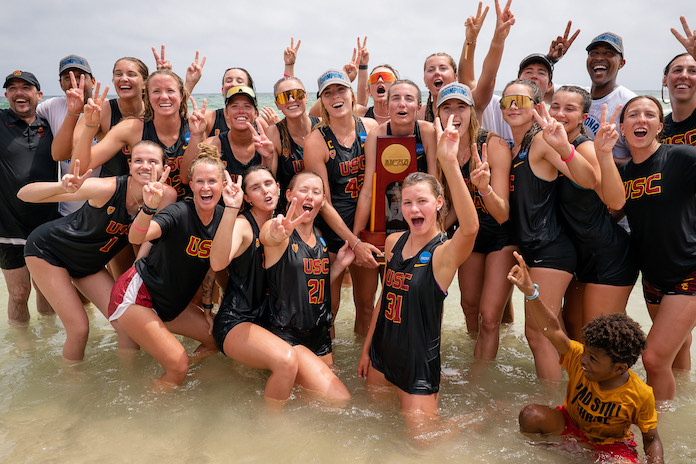The landscape of college sports was rocked to the core recently when one of its longtime flagship conferences, the Pac-12, appeared on the verge of disintegration.
We knew that UCLA and USC were leaving for the Big Ten, but then Oregon and Washington hopped on the bandwagon. Colorado announced it would depart the Pac-12 for the Big 12, and when Oregon and Washington bolted, Arizona, Arizona State and Utah joined the Big 12, too.
All that is left of the staggering Pac-12 are Stanford, California, Oregon State and Washington State. The storied “Conference of Champions” doesn’t have a media-rights deal for the 2024-25 sports year and beyond, and the recent defections make landing a lucrative one amid transitional times in TV more problematic.
For football, basketball and even women’s indoor volleyball, conference realignment will evoke profound ramifications to schedules and travel.
But will NCAA beach volleyball be similarly affected?
Probably not.
Beach volleyball remains in the formative stages, with roughly 20% of the more than 300 schools that have Division I women’s indoor teams sanctioning the sand sport. The vast majority of the beach programs are located in coastal states and most are in warm-weather climates, pretty much a necessity since it’s a spring sport that runs from late February through the NCAA Championships in early May.
The top teams all pretty much play each other in multi-squad weekend competitions, so realignment likely will have little effect on scheduling. Programs are limited to 16 competitive events during the regular season, which many collegiate coaches contend is not enough, and teams typically will play around 30-32 duals.
In the short term, the 2024 beach season should be business as usual, since the Pac-12 exodus won’t hit until the 2024-25 sports year that begins in the fall. The biggest immediate question is the status of the Coastal Collegiate Sports Association, which is down to four teams after TCU and Missouri State joined Conference USA.
The CCSA’s four remaining programs are LSU, Florida State, Grand Canyon and South Carolina, all of which were ranked among the top 17 in the final 2023 AVCA beach poll, so the league has strong underpinnings. However, the CCSA needs to add at least two teams to keep its automatic bid to the NCAA Championship. One possible addition might be Texas, which in its second season on the sand intends to ratchet up its recruiting of beach-only…
Click Here to Read the Full Original Article at Volleyballmag.com…

